 My work is wrapped up in the self I knock against every ordinary day. It is in my home. It is there with me on vacation. It is in breathing and being; in worrying less and wondering more; in the act of loving (or cooking or cleaning or playing or resting), rather than in analyzing how well I’m doing it. Don’t get me wrong; my work is hard work (as is yours). But it is very simple. It is right in front of me.
My work is wrapped up in the self I knock against every ordinary day. It is in my home. It is there with me on vacation. It is in breathing and being; in worrying less and wondering more; in the act of loving (or cooking or cleaning or playing or resting), rather than in analyzing how well I’m doing it. Don’t get me wrong; my work is hard work (as is yours). But it is very simple. It is right in front of me.
All in Truth
 When my boys ask me on the way to church why I like the Liturgy I tell them, “Because it’s beautiful.” I ask them to look for that beauty, not just now, but always, even one moment of that beauty in the middle of the noise, in the middle of the boredom. I tell them about the wind turbines on either side of I-65 near Lafayette, how on a long journey it’s important that we observe those small moments of beauty, though we might be tired or bored or hungry or distracted.
When my boys ask me on the way to church why I like the Liturgy I tell them, “Because it’s beautiful.” I ask them to look for that beauty, not just now, but always, even one moment of that beauty in the middle of the noise, in the middle of the boredom. I tell them about the wind turbines on either side of I-65 near Lafayette, how on a long journey it’s important that we observe those small moments of beauty, though we might be tired or bored or hungry or distracted.
 Where I once thought of my vocation or calling in somewhat linear, marked-trailhead sort of terms — hoping to discern the all-inclusive single occupation best matched to my personality profile, or to divinely sense the most intuitive, singularly direct path for making a positive difference in the world — my experience has instead felt more like wandering-with-intention toward the next little rock pile where I inevitably see more of the terrain that lies before me.
Where I once thought of my vocation or calling in somewhat linear, marked-trailhead sort of terms — hoping to discern the all-inclusive single occupation best matched to my personality profile, or to divinely sense the most intuitive, singularly direct path for making a positive difference in the world — my experience has instead felt more like wandering-with-intention toward the next little rock pile where I inevitably see more of the terrain that lies before me.
The Virtue of Staring
The skill of intentional staring has been made obsolete by our fast-paced society. There is so much new to see that stopping to stare can be an almost frightening experience. After all, we just might miss something novel and viral — the topic of every chat room and all our Facebook friends. Like so many skills from the past, sustained staring will have to be recovered just as slow food, reading aloud, unhurried conversation, and honoring rest as essential to creativity, personhood, and good work are being rediscovered by so many in a generation weary of the empty promises of modernity.
 Silence a man’s inner dialogue and take away the filter through which he runs what he chooses to say and what he keeps inside, and what comes out of him will likely fall closer to the truth than to fiction. If this is true, then it is in me to belittle kindness and glare at beauty. It is in me to tell the ones who love me most to go away. It is in me to reject the advances of grace. And it is true. I know it is.
Silence a man’s inner dialogue and take away the filter through which he runs what he chooses to say and what he keeps inside, and what comes out of him will likely fall closer to the truth than to fiction. If this is true, then it is in me to belittle kindness and glare at beauty. It is in me to tell the ones who love me most to go away. It is in me to reject the advances of grace. And it is true. I know it is.
 Joy can be found in the most unexpected places. In the hurting (or rejoicing) co-worker down the hall, in the redemption offered by a hard conversation with a friend, and in the painful void that accompanies loneliness. Every day and every season bring a unique composition of light and shadow. Every day and every season offer new opportunities to experience joy.
Joy can be found in the most unexpected places. In the hurting (or rejoicing) co-worker down the hall, in the redemption offered by a hard conversation with a friend, and in the painful void that accompanies loneliness. Every day and every season bring a unique composition of light and shadow. Every day and every season offer new opportunities to experience joy.
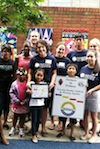 Artists and gardeners aren't the only ones who should be creating or coaxing life. I've started six urban gardens in three different cities and I can't stress how essential it is to co-create with those whom you want to build bonds. It is incarnational and it is transformational. It works across languages and ages. Three sunflower seeds can be enough. A tomato plant is even better. A public art project is outstanding.
Artists and gardeners aren't the only ones who should be creating or coaxing life. I've started six urban gardens in three different cities and I can't stress how essential it is to co-create with those whom you want to build bonds. It is incarnational and it is transformational. It works across languages and ages. Three sunflower seeds can be enough. A tomato plant is even better. A public art project is outstanding.
 There, floating with these beautiful newfound sisters in the cool, emerald green water of the Frio River, amongst the tiny flickering fish and the long blades of grass, I felt my heart settle into the deep quiet. I didn’t have an ongoing grocery list running through my mind. I wasn’t worried about the kids and whether or not my husband had remembered the sunscreen. I did not even have to fight the insecurities that normally gnaw at me about my body in a swimsuit. No, for the first time in a great long while, I let go.
There, floating with these beautiful newfound sisters in the cool, emerald green water of the Frio River, amongst the tiny flickering fish and the long blades of grass, I felt my heart settle into the deep quiet. I didn’t have an ongoing grocery list running through my mind. I wasn’t worried about the kids and whether or not my husband had remembered the sunscreen. I did not even have to fight the insecurities that normally gnaw at me about my body in a swimsuit. No, for the first time in a great long while, I let go.
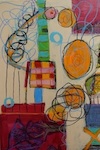 I have learned that on my own, in my response to the call of creation and the Creator, I am finite. I understand a few small truths and can reach only so far alone. I cannot teach myself all that I need to know and understand. When I find myself pushing the constraints of this finitude, I need the gifts of others to pull me through the fog into the next clearing. I will not reach my destination — nor even understand it — without them. I would like to. I long for independence and self-actualization. I want to do things on my own. But the fact is, I lack much.
I have learned that on my own, in my response to the call of creation and the Creator, I am finite. I understand a few small truths and can reach only so far alone. I cannot teach myself all that I need to know and understand. When I find myself pushing the constraints of this finitude, I need the gifts of others to pull me through the fog into the next clearing. I will not reach my destination — nor even understand it — without them. I would like to. I long for independence and self-actualization. I want to do things on my own. But the fact is, I lack much.
 I had thought that this Catholic Mass would be so very different from the evangelical style of worship I was trying to take a break from. And I’d hoped, though I’d hardly admitted it to myself, that I might feel differently here, among the pillars and marble.
I had thought that this Catholic Mass would be so very different from the evangelical style of worship I was trying to take a break from. And I’d hoped, though I’d hardly admitted it to myself, that I might feel differently here, among the pillars and marble. But too much of it was familiar — the anemic guitar, the warbly singers, the optimistic lyrics. Sitting uncomfortably among the singing believers a burn of anxiety scrambled up my esophagus. I was irritated. The air conditioning irritated me. The music irritated me. The congregation irritated me. And my headache showed no signs of abating. Communion was coming, I knew that much from reading ahead in the program. I began to plan my escape.
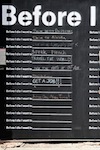 The shift happened slowly — over the course of the past five years as we added three children to our number and I found it more and more difficult to gather the energy to think clearly past 7:00 p.m. But it is unfair to blame entirely on parenthood the erosion of my thought life and the absence of any aspirations beyond surviving today. Perusing design blogs, Pinterest recipes, and perfectly staged photos of a stylized life is just easier than doing the real thing, and it always has been.
The shift happened slowly — over the course of the past five years as we added three children to our number and I found it more and more difficult to gather the energy to think clearly past 7:00 p.m. But it is unfair to blame entirely on parenthood the erosion of my thought life and the absence of any aspirations beyond surviving today. Perusing design blogs, Pinterest recipes, and perfectly staged photos of a stylized life is just easier than doing the real thing, and it always has been. For the force of hunger is a movement toward life, a movement of life. These pangs of hunger are evidence of hope, a sign to keep looking for things not yet seen, not yet at hand. If I were full, would I need to keep traveling? The pilgrimage might come to an early end.
For the force of hunger is a movement toward life, a movement of life. These pangs of hunger are evidence of hope, a sign to keep looking for things not yet seen, not yet at hand. If I were full, would I need to keep traveling? The pilgrimage might come to an early end.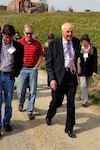 Today, I live in the heart of East Nashville; tomorrow, my husband and I long for a house on 20 acres with goats, chickens, and a great Pyrenees. Today, we acknowledge the harsh realities of life as modern American farmers. Tomorrow, we hope we are up to the challenge. Today, we read, we plot, and we plan. Tomorrow is not ours.
Today, I live in the heart of East Nashville; tomorrow, my husband and I long for a house on 20 acres with goats, chickens, and a great Pyrenees. Today, we acknowledge the harsh realities of life as modern American farmers. Tomorrow, we hope we are up to the challenge. Today, we read, we plot, and we plan. Tomorrow is not ours. As Wendell Berry says, “Tomorrow doesn’t exist.”
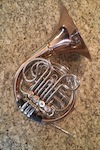 Music and writing seem to be flip sides of the same coin. I view my musical life and my writing life through very different lenses, but both have taken on the patina of parenthood. At least it’s a familiar feeling, like coming home. Home to a small oasis in a sea of dishevelment teeming with maple-syrup-encrusted children, a supportive spouse, and really excellent coffee.
Music and writing seem to be flip sides of the same coin. I view my musical life and my writing life through very different lenses, but both have taken on the patina of parenthood. At least it’s a familiar feeling, like coming home. Home to a small oasis in a sea of dishevelment teeming with maple-syrup-encrusted children, a supportive spouse, and really excellent coffee. In a time threaded with liminality, all I have to offer is my finite, fallible self, my defenseless skin, and I try to hold onto my capacity to be faithful to the inexhaustible opening of time and whatever glories or agonies attend it. I think about the coming months, this precarious stretch, my parents and my infamous traveling Crock-Pot, the urgencies of art, stacks of sentences that require me to wrap myself around silence and suffering and joy's quiet possibilities so closely that I recognize myself in every note of grandeur and desolation.
In a time threaded with liminality, all I have to offer is my finite, fallible self, my defenseless skin, and I try to hold onto my capacity to be faithful to the inexhaustible opening of time and whatever glories or agonies attend it. I think about the coming months, this precarious stretch, my parents and my infamous traveling Crock-Pot, the urgencies of art, stacks of sentences that require me to wrap myself around silence and suffering and joy's quiet possibilities so closely that I recognize myself in every note of grandeur and desolation. Listening to a record is a physical process. I don't type a name in a search box; I kneel and flip through record sleeves. I stand, and lift the lid, and place the needle just right. The music requires attention, and after a few songs, I move to turn the record over. The records, and the player, take up physical space in my life — a rooted kind of space. They require a physical response, and like the prayers at church, they are repeated. Place and posture, roots and response, attention and repetition: these not only signal that what I'm doing means something, but that it is creating meaning as well.
Listening to a record is a physical process. I don't type a name in a search box; I kneel and flip through record sleeves. I stand, and lift the lid, and place the needle just right. The music requires attention, and after a few songs, I move to turn the record over. The records, and the player, take up physical space in my life — a rooted kind of space. They require a physical response, and like the prayers at church, they are repeated. Place and posture, roots and response, attention and repetition: these not only signal that what I'm doing means something, but that it is creating meaning as well. There’s an aloneness to art. We type, paint, sculpt, compose in isolation. We create to realize our theologies, philosophies, hurts, joys, doubts, faiths. We create to understand and work out our lives. And because we worship what we perceive to be the fount of truth and beauty (a God or gods, self, nature, universal energy, materials), we create to worship.
There’s an aloneness to art. We type, paint, sculpt, compose in isolation. We create to realize our theologies, philosophies, hurts, joys, doubts, faiths. We create to understand and work out our lives. And because we worship what we perceive to be the fount of truth and beauty (a God or gods, self, nature, universal energy, materials), we create to worship.
But while worship begins as a personal endeavor, it involves other people around us.
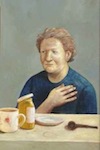 In my letters I tell him, “I wish you were here so I could make dinner for you.” I daydream about how when he is released, eight years from now, I’ll have mastered new cooking skills and will prepare him whatever he wants, however much he wants. I imagine I’ll hold a spoon coated in sauce or frosting up to his mouth and say, “Here. Taste this.” And he’ll close his eyes and taste it and then smile, like we were in a movie or something.
In my letters I tell him, “I wish you were here so I could make dinner for you.” I daydream about how when he is released, eight years from now, I’ll have mastered new cooking skills and will prepare him whatever he wants, however much he wants. I imagine I’ll hold a spoon coated in sauce or frosting up to his mouth and say, “Here. Taste this.” And he’ll close his eyes and taste it and then smile, like we were in a movie or something. So, in order for me to think justly about my world, I have to know my world the way my Creator does — namely, that I belong to my world and it belongs to me. And I belong more immediately and vitally to my immediate surroundings. As it relates to people, justice is rooted in God’s desire for people. In my opinion, that desire is never general and statistical but always particular and personal. So if I am to live more justly and foster truth, goodness, and beauty, I must localize. I must know, personally and particularly, the place and the people to whom I’ve been given.
So, in order for me to think justly about my world, I have to know my world the way my Creator does — namely, that I belong to my world and it belongs to me. And I belong more immediately and vitally to my immediate surroundings. As it relates to people, justice is rooted in God’s desire for people. In my opinion, that desire is never general and statistical but always particular and personal. So if I am to live more justly and foster truth, goodness, and beauty, I must localize. I must know, personally and particularly, the place and the people to whom I’ve been given.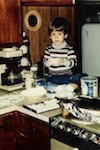 We lined the jars on the familiar countertop, but first things first: blanching and cutting the tomatoes. It takes some waiting, I discovered, but only after scalding my fingers — too impatient to let the water cool down. When I asked Grandma how she knew how much salt and sugar to add to the jars, she looked at me and said, “I do it that way because that’s what my mama always did.” There is no written recipe, only paying attention.
We lined the jars on the familiar countertop, but first things first: blanching and cutting the tomatoes. It takes some waiting, I discovered, but only after scalding my fingers — too impatient to let the water cool down. When I asked Grandma how she knew how much salt and sugar to add to the jars, she looked at me and said, “I do it that way because that’s what my mama always did.” There is no written recipe, only paying attention.














